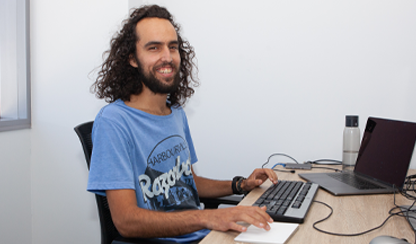 PhD student Gavriel Olshansky's research is at the intersection of mathematics and medical science — finding better ways to identify patterns in large biological data sets that can help us pinpoint markers of disease.
PhD student Gavriel Olshansky's research is at the intersection of mathematics and medical science — finding better ways to identify patterns in large biological data sets that can help us pinpoint markers of disease.
Gavriel is one of the first students to be enrolled in the new Baker Department for Cardiometabolic Health at the Melbourne Medical School, a partnership between the Baker Institute and the University of Melbourne. While his background is in mathematics and statistics, he is no stranger to the lab, starting at the Institute two years ago, first as a volunteer and then as a bioinformatician.
"Over this time I've been exposed to lots of datasets and biological problems that we're trying to solve, and I recognised the need to develop more tools for meaningful analysis of this data," Gavriel said.
"I like being immersed in the methods and models but I also really value the applied aspect of health research. It's a practical approach, where the research is driven by real life problems and you clearly see the impact in improving outcomes for patients."
In the Baker Institute's Metalobomics lab Gavriel will be looking at the hundreds of lipids which circulate in the human body, to find ways of using these as a biomarker to better predict people's risk of certain diseases.
"I'll be specifically looking at the network structure of the lipidome, which refers to the totality of lipids in a cell. So how they combine together, and the processes of dysregulation that cause disease," he said.
"We have lots of lipids circulating in our body, and lots of them are highly correlated between themselves and with chronic disease, which makes it hard to extract what is the most meaningful marker. So I'm looking at statistical methods to analyse and model the data to get some useful insights."
Having completed his studies so far at the University of Melbourne, Gavriel saw a PhD through the new Baker Department of Cardiometabolic Health as a great opportunity to stay connected with the University as well as his colleagues at the Institute.
"I like the collaboration encouraged by this model, and the access to a wide range of expertise. Now that a computational biology lab has been established at the Institute, it's great to be part of the growing bioinformatics capabilities being established here as well," he said.
Travel is also high on Gavriel's wish list during his PhD studies, to learn and share with others working in bioinformatics around the world. A keen traveler and outdoor adventurer, Gavriel is hoping this will open up sooner rather than later as we look to the pathway out of the COVID-19 pandemic. But currently living in St Kilda, Gavriel has taken up ocean swimming as a way of getting his adventure fix, even heading out into the bay over winter!






